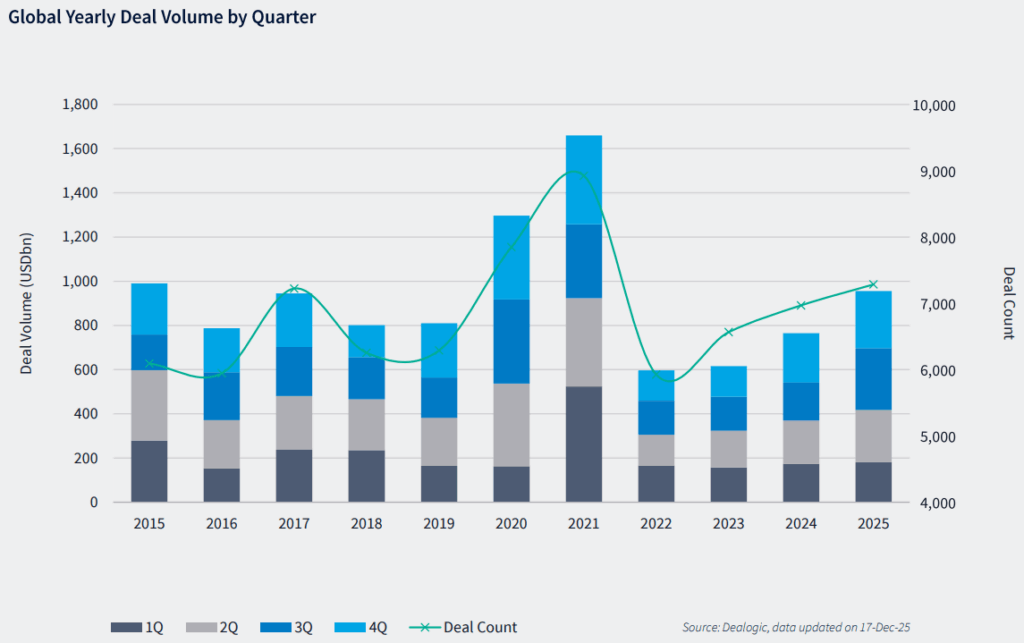UK IPOs could find their mojo as AI revolution, economic clouds demand shareholder backing – ECM Pulse EMEA
The gloom that has hovered over the London Stock Exchange (LSE) since the start of 2022 seems to have lifted a little after the IPOs of challenger lender Shawbook and Italian tinned food carve-out Princes Group. In a new world where companies desperately need to fund AI-focused tech investments driving growth amid choppy and changeable economic waters, London’s track record of shareholder support should provide some public markets pull.
The pricing of these two mid-cap IPOs, alongside the listing of Beauty Tech Group earlier in October, and the dual listing of Fermi America on the LSE in September, has lifted London to a four-year IPO volume high.
This provides a fantastic backdrop for the 2026 IPO pipeline, led by HG-Capital backed Visma, kindling hope for sunnier days ahead.
Depression around London has frankly been overdone for some time – while UK IPO volumes have dwindled in recent times, it is far from alone among European bourses.
Italian IPO deal value has dropped to negligible levels in 2024 and 2025, according to Dealogic; as has French issuance, with Paris listings not breaching the USD 1bn mark since 2021.
Germany has been an exception with a few stellar deals – but even Sweden, typically a strong European IPO market, had little activity between 2022 and 2024 before roaring back to life this year, with the mega-IPO of security systems business Verisure, among others.
In the low rates environment of a decade or more following the global financial crisis, private capital cemented its position as the pre-eminent route for corporate financing or change of ownership. In the parallel debate about the value of going public versus staying private for longer, London has nonetheless maintained a huge advantage over other European exchanges.
That advantage lies in the sheer depth of the capital pools that buy UK listed stocks, which was Fermi’s stated rationale for including a London leg to its listing.
But that’s not all. While the Bank of England is engaged in a very cautious rate cutting cycle, higher interest rates since 2022 and unwinding of central bank QE mean that corporates must work harder to deliver higher share prices, whether through genuine value creation via M&A or organic growth. No more debt-funded buybacks or free money for inorganic expansion.
No-one wants to be left behind, with cyclical trends auguring huge capex requirements for corporates in the years ahead to align with – and succeed in – the AI revolution.
Businesses must look at creative means to finance this if debt is expensive – and equity, in many cases, will become the go-to for many. For private companies there is now a real business rationale to pursue a public listing.
After recent reforms, London is by far Europe’s most frictionless exchange for equity raising; it also has form as Europe’s main hub for primary equity capital.
Over the last 20 years, just over USD 610bn of primary equity has been raised by issuers listed in London, around 30.5% of the total primary capital raised in Europe over the same period, which includes many a continental bank rights issue in the wake of the financial crisis.
Source: Dealogic, European primary follow-ons since 2005
The UK is third this year so far for primary equity capital raised, in terms of the value of such capital hikes – a rare time it hasn’t taken the top spot, but only because of Orsted’s colossal rights issue and a huge primary raise from Iberdrola, boosting Denmark and Spain, respectively.
Despite likely losing the gold medal in 2025 in terms of deal value, London has seen some huge raises, such as the GBP 1.2bn raise by Rosebank Industries on London’s junior AIM exchange earlier this year.
And London has still seen 277 primary raises year-to-date (YTD) – by far the largest deal count in Europe. This flow is a real USP for London – and the growing requirement for more equity capital to lay the groundwork for a new corporate age could provide the gravity to suck in yet more listings.
“What the UK equity market does well is back really good buy-and-build M&A and growth stories – and UK institutions are historically very supportive of this, like we saw with Rosebank,” said an ECM banker. “Being listed in the UK has so many advantages that stretch well beyond what valuation you might get at IPO.”
London’s large-cap listings longing
The pricing of both Shawbrook and Princes Group deals means the UK has had IPO volumes of around USD 2.2bn as of the end of October, according to Dealogic, by far its best YTD showing since 2021. While this figure is still well below that blow-out year, or even London’s pre-pandemic norms, it’s a glimmer of light in what has been a dark few years for LSE listings.
“Shawbrook is a great sign that the UK market is not dead and there is mid-cap money for listing, and you still get the international money in there as well, which you wouldn’t have got in other exchanges,” said an investor. “It isn’t a massive pop but that was the expectation, so for me a gain of about 5% to 6%, where it seems to have found a level, is a good result, especially for London.”
Shawbrook finished its second day of trading, Friday 31 October, just above IPO price. Princes Group closed flat to its IPO price on the same day, its first day of trading.
Shawbrook, Princes and Beauty Tech Group are all mid-cap businesses, with market capitalisations under USD 5bn; there are several larger transactions preparing for listings next year, which will test UK capacity. Visma, alongside EQT-backed IVC Evidensia and Uzbekistani goldminer Navoi, will lead a cohort of larger UK IPOs for 2026, as we have been previewing for some time.
Source: Dealogic, UK IPO volumes YTD
“This window for the UK always seemed like a bit of a prelude for 2026,” said a second banker. “Next year you are going to likely have Visma, Navoi and IVC Evidensia although the timing on all of them is a little flexible.
“There are also other possible names in the pipe.”
A third banker noted that London still has something to prove on large-cap listings, having not had a USD 1bn-plus IPO on the LSE since 2021. But others are more optimistic.
“I see no reason why London can’t absorb big deals,” said the investor.
Momentum begets momentum in ECM and the more listings that are successfully priced in London the better other issuers will feel about the UK.
While this is clearly just the start of hoped renaissance for the LSE, it would at least seem that the metaphorical rainclouds which have hovered over Paternoster Square for the last few years have partially cleared after the pricings of Shawbrook and Princes. Some may dub it an ill omen that Princes could be considered a waymarker towards further IPO success – investors going long tinned goods might reasonably be considered a hedge against tough times to come. All joking aside, if the economic cycle does turn frosty at the same time as corporates need to double down on futureproofing capex, equity will find further favour and the deepest pools of capital will be the most attractive.
In this context, London remains the European champion. Unusually for the UK, hopes for better times ahead might in this case be well founded.













